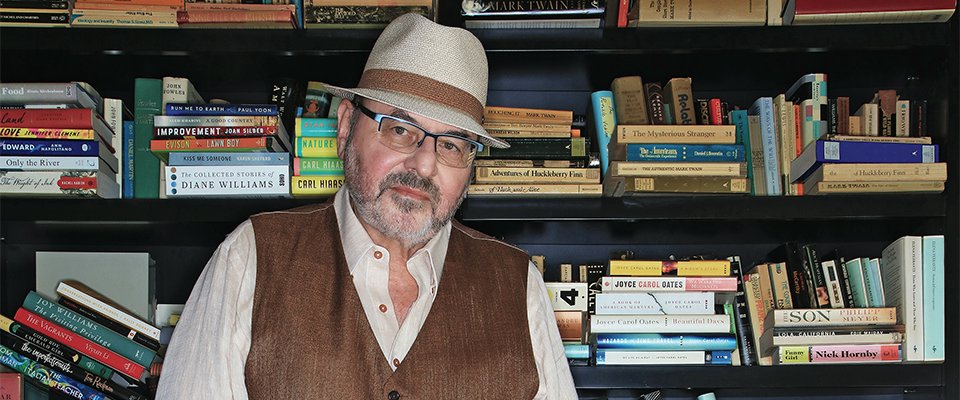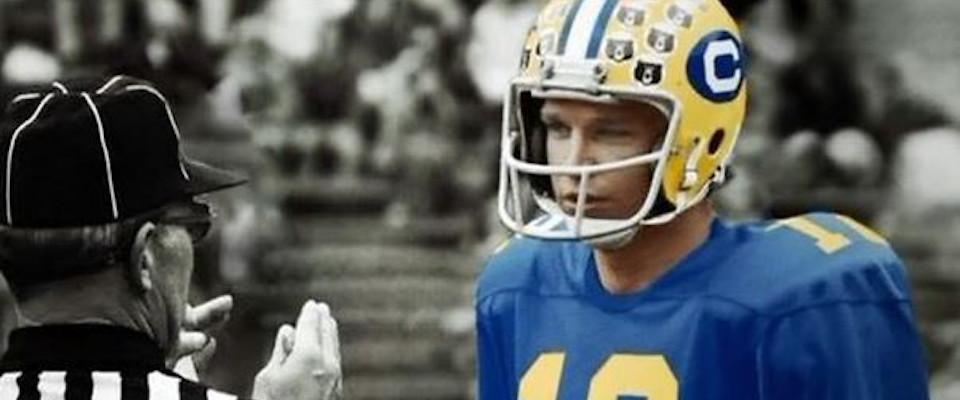WHEN HE WAS A GRAD STUDENT in Berkeley in the 1970s and ’80s, pursuing his Ph.D. in English, Joe Di Prisco would often duck out of Wheeler Hall to place bets on sports games from campus pay phones. It wasn’t the only angle he was working back then. Di Prisco was also part of a local card-counting crew that hit blackjack tables from Vegas to the Caribbean to South Africa’s Sun City, where his success at the tables finally gained too much notice and he was barred from casinos—not just in South Africa, but back in the states as well.
Joe Di Prisco is an author in his own right, and a rather prolific one at that, with 11 volumes to his name, including fiction, poetry, and two books on teenage
psychology.
Gambling may not sound like a promising avocation for a young scholar-in-training, but Di Prisco didn’t just survive the rigors of academia, he flourished, completing his dissertation on Mark Twain, advised by English Professor Frederick Crews (best known for The Pooh Perplex, his satiric takedown of academic pomposity), while racking up a slew of awards. He was a James Phelan Fellow in Art, two-time winner of the Eisner Prize in Poetry and Prose, and a five-time winner of the Samuel C. Irving Prize for American Wit and Humor.
Decades later, Di Prisco quietly added to the roster of literary awards associated with Cal when he spearheaded the Simpson Literary Project, a far-reaching collaboration between Berkeley’s English department and the Lafayette Library and Learning Center Foundation. Named for the late Bay Area philanthropist Barclay Simpson and his wife Sharon Simpson, the project, rechristened in 2021 the New Literary Project, sponsors the annual Joyce Carol Oates Prize, which carries a $50,000 cash award for “emerged and still emerging” fiction writers.
Di Prisco is an author in his own right, and a rather prolific one at that, with 11 volumes to his name, including fiction, poetry, and two co-written books on teenage psychology. The latter is a subject he knows well from two decades spent teaching English at middle and high schools, including seven years at San Francisco’s prestigious University High. He also wrote two memoirs, Subway to California (2014) and The Pope of Brooklyn (2017), both of which mine his family’s Brooklyn roots and his father’s run-ins with the law.
In the summer of 1961, 10-year-old Joseph Di Prisco was walking down a country road near his grandparents’ Long Island farm with his father and younger brother, John, when they saw that their house “was surrounded by black and white police cars and other … chariots of law enforcement,” he recalls in Subway to California. “It would take longer, much longer, for me to have a clue as to what the FBI wanted with my father and what it was that drove us far from home.” He later learned that his father, a gambler and bookmaker, was a star witness and an informant in a case against corrupt cops who were shaking down bookmakers.
The senior Di Prisco, known around his Greenpoint neighborhood as “Pope,” thought it best to hit the road, rather than face the twin prospects of testifying in open court and potential mob retaliation. Rather than surrender to authorities, he took off cross-country, landing 3,000 miles away in Berkeley.

Growing up, Di Prisco attended parochial schools. After graduating from Saint Mary’s College High School, he did a stint as a novitiate at the Christian Brothers monastery in Napa Valley. “It wasn’t a good fit,’’ Di Prisco said of his short-lived vocation. “One day, the abbot called me in, and said, ‘Brother Joseph, you make too many jokes.’”
From the monastery he went to Syracuse University in 1969, where he mixed activism with literary aspirations, managing to graduate summa cum laude despite an incident in which he and fellow demonstrators seized the school administration office. His mentor at Syracuse, noted essayist and Cal alumnus George P. Elliott ’39, M.A. ’41, wrote a glowing recommendation for him to his alma mater. “He wrote me a very nice letter of recommendation, a two-line recommendation … they were pretty damn good,” Di Prisco says.
It probably didn’t hurt that Elliott also put in a good word for his protégé with poet and Cal faculty member Josephine Miles, one of the towering figures of the English department.
Di Prisco was accepted to Berkeley in 1973. The aforementioned awards notwithstanding, the path to his doctorate was a struggle. He still vividly recalls the hostility he braved from one professor on his oral examination committee. He insisted on immediately retaking the orals and he passed, graduating from the program in 1986.
Di Prisco first met Sharon Simpson at a dinner party in the early ’90s hosted by their mutual friend Katharine Michaels and her late husband, the celebrated novelist and Berkeley Professor Leonard Michaels. “We were guests, along with Joe and Patti, for dinner … and we just fell in love with each other and hit it off right away,” Simpson says. “I was on the [California Shakespeare Theatre] board … and so I approached him a couple months later and said, ‘Joe, would you be interested in being on our board?’ … He said, ‘yes,’ and we were thrilled.”
“The success of the Simpson Literary Project and the Joyce Carol Oates Prize is due in no small part to Joe’s ability to take people as they are and bring out their best.”
Di Prisco, in turn, approached Simpson with the idea of the literary project. He knew of her husband Barclay’s love of books and support for libraries and wanted to do this in his honor, Simpson recalls. “I sort of didn’t know what to say … I told him up front I wouldn’t be contributing to it, that I already had so many irons in the fire and commitments I’d made to other organizations,” she says. “And he said, ‘Oh, no, no, no, that’s fine.’ So, of course, all these years later, I am involved—and yes, I do give them a little bit of money.”
She’s amused by Di Prisco’s unconventional background and enjoys his larger-than-life persona, adding that Joe and his glamorous wife, Patti, cut quite a figure (“like something out of the ’40s”) even in mundane moments like driving to the grocery store in Joe’s prized Maserati. She was also impressed by his success in recruiting legendary author Joyce Carol Oates, a visiting professor at Cal between her regular Princeton duties.
“Berkeley was an alternate reality to me,” Oates recalled via email, adding that Di Prisco made her feel welcome in her “somewhat ‘borrowed’ milieu.” The two grew even closer after they team-taught a memoir course together at the Lafayette Library in spring 2019. “He did seem somewhat, to my husband Charlie Gross, to be a transplanted (fellow) Brooklyn-ite, which was most welcome. (Little did we know at the time of our first meeting that Joe’s family background might have been filmed by Martin Scorsese in the mode of Goodfellas…).”
Oates is excited by the Simpson Foundation’s deep and “somewhat unusual” commitment to mid-career, mid-list writers. “Helping ‘emerging’ writers is at least as crucial as helping new writers, of course—in some cases, the ‘emerging’ writer may be facing more difficulties than the beginning writer.”
In 2017, the inaugural winner of the Joyce Carol Oates Prize—originally called the Simpson Literary Prize—was Cal alumnus T. Geronimo Johnson, whose exuberant novel Welcome to Braggsville was hailed in the New York Times as “the funniest sendup of identity politics, the academy and white racial anxiety to hit the scene in years.”
“Joe tackles the big issues—life, death, family, God—from all angles: through poetry, comedy, memoir, novels, even nonfiction works that explore the emotions of adolescents.”
Johnson—who has taught writing at Stanford and Cal, where he delivered the 2017 English department commencement address—described Di Prisco in an email as “one of literature’s ambassadors-at-large.” He added: “Joe is a fine poet and prose writer, but also a hell of a poker player and a man of the people. I realize that’s a slippery term at the moment, but this is Joe’s most admirable quality; he straddles the academy and the real world, engages people in both camps with equal enthusiasm, and treats everyone with equal respect. The success of the Simpson Literary Project and the Joyce Carol Oates Prize is due in no small part to Joe’s ability to take people as they are and bring out their best.”
Subsequent awardees include Anthony Marra in 2018, Laila Lalami in 2019, Daniel Mason in 2020, and Danielle Evans in 2021. According to the prize announcement, Evans, author of the story collections The Office of Historical Corrections and Before You Suffocate Your Own Fool Self, will take up short-term residency at Berkeley during the spring semester of 2022.
There’s more to the New Literary Project than just the prize. Other efforts include the annual Simpsonistas story anthology featuring work by Oates Prize winners and finalists and from writing workshops in libraries and schools, including Contra Costa County Juvenile Hall. And Di Prisco recently produced a filmed performance called “Shakespeare & the Plague.” As The Norton Shakespeare editor, Professor Stephen Greenblatt—formerly of Berkeley, now at Harvard—reminds viewers in the introduction to the mash-up, the Bard “lived his whole life in the shadow of the plague.”
These projects haven’t deterred Di Prisco from pursuing his own literary efforts and ambitions, which are lofty. As his longtime editor and fellow Cal alum Regan McMahon puts it: “Joe tackles the big issues—life, death, family, God—from all angles: through poetry, comedy, memoir, novels, even nonfiction works that explore the emotions of adolescents.” McMahon says she wouldn’t be surprised if Di Prisco had many more manuscripts that he hasn’t yet gotten around to showing her in the study of his Lafayette home.
In fact, Di Prisco has lately turned to a relatively new form for him: the short story. “When the pandemic hit, I [was] discombobulated like everybody else,” he recalls. “And I looked at some recent poems of mine and I said, ‘These are stories.’ … Writing a novel is like opening up a business. A poem is like shoplifting.” The short story, he says, has given him “a new lease on life as a writer” and has served as a coping mechanism for the barrage of what we’ve been dealing with.
Despite the many challenges of 2020, Di Prisco retains a hopeful vision of the future, and for literature. In an end-of-year message, Di Prisco wrote to the project’s supporters, acknowledging that the pandemic had hit the project and the larger community hard. But, he insisted, “We are not giving up. We have a story to tell, and it’s your story, and our story. Storytellers forge a literate, democratic society, and that’s a truth worth the struggle.”
Paul Wilner is a longtime journalist, poet, and critic who lives in Monterey County. He is the former editor of the San Francisco Examiner Magazine, San Francisco Chronicle style section and managing editor of the Hollywood Reporter.




















